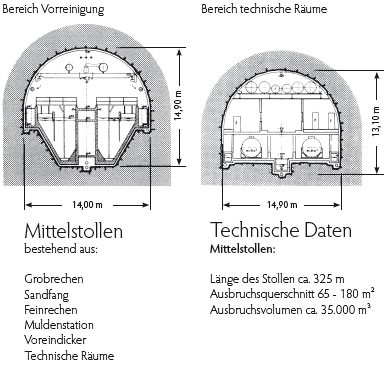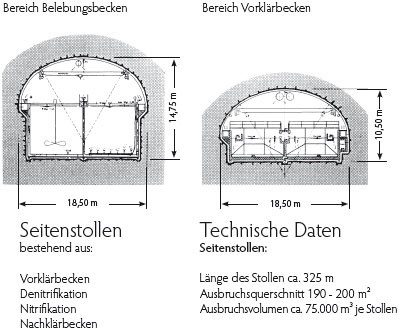The consortium of contractors from the Autonomous Province of Bolzano-South Tyrol was commissioned with the basic procurement, planning and construction.
The consortium of contractors is an association of qualified local construction companies with the aim of increasing performance and competitiveness.
Time lapse:
| 1990 |
- Selection of the six construction companies by the South Tyrolean construction consortium |
| 1991 |
- Signature of the Convention |
| 1992-1993 | - Excavation after NÖT in the three caverns |
| 1993-1994 | - Concrete work: 50.000m3 - Reinforcing steel: approx. 1500 tons |
| 1995 |
- Assembly of the electrical and mechanical equipment |
| 03.07.1996 | - Punctual commissioning after completion of the functional tests |
| 1998 | - Commissioning of sewage sludge drying plant |
| 2004-2005 | - Construction and commissioning of the thermal sewage sludge utilisation plant |
| 2008 | - neue Bandtrocknungsanlage |
The excavation as well as the securing and extension works were carried out according to the Austrian tunnel construction method (NÖT). The lining was carried out in two phases, shotcrete and expansion anchors or mortar anchors, reinforcement mats and shotcrete. The rock reinforcement acted as a permanent load-bearing element ("single-shell lining"), which placed higher demands on the quality of the materials and the execution. 13 measuring stations (convergence measurements with five convergence bolts each, multiple extensiometers, levelling etc.) were installed for the metrological monitoring of the lining work. Construction was carried out around the clock in 3-shift operation.
"Single-shell removal": the rock protection acts as a permanent load-bearing element.
Structure:
- 2-5 cm shotcrete (sealing)
- 1st layer: shotcrete 10-15 cm, reinforcement mat diam. 5/20/20, mortar anchor, N = 4,5 - 6,0 - 7,50 m weight bar diam. 28 mm
- 2nd layer: shotcrete 10 cm HS cement, reinforcement mat, diam. 5/20/20
The Inlet Tunnel
The intake tunnel, with a diameter of 3.9 m and a length of 930 m, was milled and at the same time served as an exploration tunnel. In the area where the Gader River flows into the Rienz River, the individual sewers are fed into the intake structure of the intake tunnel. Due to the depth of the canals (5.0 m below the water level), extensive drainage work was necessary.
Technical data caverns:
| Total outbreak: | ca. 200.000m³ |
| securing area: | ca. 50.000m³ |
| Sprayed concrete: | ca. 12.000m³ |
| Armature: | ca. 50.000m |
| Steel mats: | ca. 200.000kg |
| Explosives consumption: | ca. 150.000kg |
| levelling concrete: | ca. 2.000m³ |
| Structural concrete: | ca. 22.000m³ |
| Reinforcing steel: | ca. 1.500.000kg |
| Formwork: | ca. 50.000m² |
a) central gallery

b) side galleries
